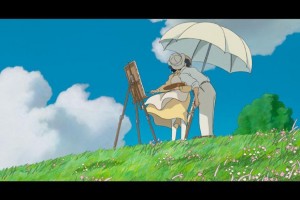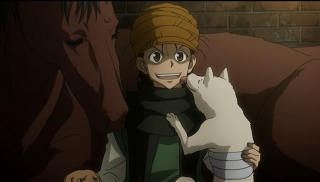As we grow older, we are forced to accept the fact that those people who helped to form our childhood are also getting older. We are made to understand that being influential does not make one immortal, at least not in a literal sense. And so, thousands of people the world over are slowly coming to terms with the fact that Hayao Miyazaki is truly, truly retiring this time.
I finally saw The Wind Rises last week, dubbed, in a small local theatre that plays mostly foreign, independent, and/or historical films. And what can I say? Zach has already provided the Amazing Stories readership with an excellent review, so I hardly need to go that route. But the moment the credits began to roll, I knew that there was more to be said about the legacy that Miyazaki is leaving behind.
The Wind Rises is an important movie, all at once extremely similar to and extremely divergent from Miyazaki’s repertoire up to this point. And because of this, it’s a movie that only he could have made – and only now, that his career is coming to a definite end. Never has he shied away from having a poignant underlying theme in his stories, mostly along the lines of environmental awareness; but in The Wind Rises, the intricacy of Japanese World War II history meshed with the very personal story of Jiro Horikoshi’s life and romance bring Miyazaki’s dedication to peace and understanding of human nature to the forefront.
The film itself is not exclusively for children. Instead, it feels very much as though it is intended for those children who have grown up with Miyazaki’s strong heroines and beautiful scenery, with his bountiful imagination and simplistic sensibility. It is for those children who believe that love is both the easiest and the hardest facet of life, those children who want to achieve their dreams but also fear the never-ending stream of compromises and dangers along the way. It is for those of us who value the beauty in the mundane, who can sympathize with the citizens of a corrupt country, and who believe in quiet rebellion and awareness.
I couldn’t help but pick out moments in The Wind Rises that remind me of every other of Miyazaki’s films. And while the surrealistic dream sequences, the detailed aircraft, the plucky female characters, and the gratuitous use of facial hair and large noses all mark this film as distinct to his portfolio, the overall feeling of loss and melancholy, both in the film and because of it, pervaded my senses. This movie is a bittersweet send-off, a true masterpiece of animation and storytelling created by a man who very clearly has been putting thought into its creation for a long time now.
Maybe in some ways, Miyazaki feels as though he can relate to Jiro Horikoshi. While the former is certainly not designing kamikaze planes for an impoverished and desperate Japan, there is a sense that all of his work is marked by his desire to simply be an artist. Jiro wanted to design planes, Hayao wanted to make films. Both of them had to bend to the whims of the society they lived in, but luckily, Miyazaki has had far more leeway to express his personal tastes.
But with the rise of technology and the knowledge that he is far past normal retirement age, obsolescence seems near. And while I do not for a moment believe that Miyazaki’s films will ever lose their charm or their necessity, it is important to know when to step down. Most artists do not get to choose their last work, or they continue to make work far past their prime. As his captive audience, we are very lucky to have been graced with a film that truly showcased the skills and experiences of a master.
It is with a hopeful ache in my heart that I wish all the best to Hayao Miyazaki in his retirement. It is no exaggeration that he is a pioneer and a genius of his art, and I look forward to watching the work that Studio Ghibli continues to produce now that he is allowing his son, Goro, to take up the reins. Ghibli will not be the same, certainly, but it will continue to shine brightly with the true spirit of creating quality animation that can touch all audiences – of this, I am certain.
AUTHOR’S EDIT:
Shortly after this post was published, I was made aware of the fact that Miyazaki has, in fact, retracted his retirement for the sixth time. I had previously read a recent article that made it seem as though retirement would hold fast this time, but Miyazaki allegedly announced getting back into the game close to the new year.
That being said, much of what I felt when I wrote this post still holds true; even if The Wind Rises will not be the last of Hayao Miyazaki’s films it was still created with that intention, seeing as his announcement to return to work came long after the movie had hit theatres in Japan. And beyond that, it is still a very prolific and important movie, and I very sincerely hope that it will be setting the precedent for future work from Miyazaki and from Studio Ghibli.
(An earlier version of this post appeared on Monday, 3/13/14 and has been updated by the author.)













Good tribute to an extraordinary artist.